Charles Dickens and Maria Beadnell ("Dora")
Select Format
Select Condition 
Book Overview
Charles Dickens and Maria Beadnell ("Dora") presents the private correspondence between the renowned author Charles Dickens and Mrs. Henry Winter (n e Maria Beadnell). These letters offer a unique glimpse into Dickens' personal life and his relationship with the woman who served as the inspiration for the character of Dora in "David Copperfield."
Edited with an introduction by George Pierce Baker, this collection provides valuable insights into Dickens' emotional world and the complexities of his relationships. The correspondence spans a significant period, revealing the evolving dynamics between Dickens and Maria Beadnell, from youthful infatuation to later reflections on their past.
This volume is an essential resource for scholars of Dickens, students of Victorian literature, and anyone interested in the intimate lives of literary figures. The letters are presented with careful attention to historical context, making them accessible and engaging for a wide audience. This edition preserves the authenticity of the original documents, offering readers a direct connection to the voices of Charles Dickens and Maria Beadnell.
This work has been selected by scholars as being culturally important, and is part of the knowledge base of civilization as we know it. This work was reproduced from the original artifact, and remains as true to the original work as possible. Therefore, you will see the original copyright references, library stamps (as most of these works have been housed in our most important libraries around the world), and other notations in the work.
This work is in the public domain in the United States of America, and possibly other nations. Within the United States, you may freely copy and distribute this work, as no entity (individual or corporate) has a copyright on the body of the work.
As a reproduction of a historical artifact, this work may contain missing or blurred pages, poor pictures, errant marks, etc. Scholars believe, and we concur, that this work is important enough to be preserved, reproduced, and made generally available to the public. We appreciate your support of the preservation process, and thank you for being an important part of keeping this knowledge alive and relevant.





